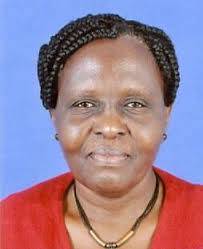Swahili
Kujulisha (Introducing) Penina Muhando Mlama
Ukarasani huku, utapata habari za mwandishi na mwanazuoni mtanzania maalum, na ufupisho wa maandiko yako. (In this page, you will find information about a famous Tanzanian writer and scholar and short summaries of her works.)

Kuzaliwa Machi terehe 3, mwaka 1948, Dk. Penina Muhando anatoka sehemu ya Morogoro, Tanzania. Aliptata digri tatu, zote kwa chuo cha Dar es Salaam (UDSM). Shahada yake ya kwanza, alisoma elimu (1971), ya pili ilikuwa ukumbi wa michezo (1973), na hatimaye, alipata shahada ya uzamifu mwakani 1983. Aliendelea kufundisha idara ya sanaa ya michezo katika UDSM ambapo anafanya kazi sasa. Wakati wa miaka themanini, Muhando aliwachukua wanafunzi kwenda vijiji kuandika michezo na wakulima. Akajibu na shida aliyogundua ambapo maskini hawakushirikisha mipango ya maendeleo. Alieleza washiriki walizungumza kuhusu matatizo muhimu walizopambana na alafu kuzielezea zilipitia maandikoni. Kadhalika, michezo yake ni kuhusu shida ya kienyeji kwa suala la muktadha wa ulimwengu, utandawazi, na ubepari. Aliandika kitabu kinaitwa Culture and Development: The Popular Theatre Approach in Africa, kuonyesha dhima ya maandika ya michezo kwa jitihadi kuzalisha maendeleo dunani na kesi ya Tanzania. Mwisho wa kitabu kina sina uzoefu wa kutembelea vijiji nne kuonyesha kesi ya programu alizoshiriki nchini kwake. Pia aliandika michezo yake kwa data alipata kutoka safari za masomo haya. Muhando alikuwa mmoja wa wanawake wa pekee kuandika kwa Kiswahili mwisho ya karne ishirini. Kwa ukarasa huu, nitaauni kunereka kwa michezo na kitabu nilichorejea aya hapo juu.
Before reading the English translation below, test your Swahili skills with the following quiz questions:
(Born March 3, 1948, Dr. Penina Muhando comes from Morogoro, Tanzania. She has three degrees, all from the University of Dar es Salaam. Her undergraduate study was in education (1971), her master’s in theater (1973), and she received her PhD in 1983. She went on to teach in the Theater Arts department at UDSM, where she continues to work. She used to take students to villages to write plays with farmers. She responded to an issue she realized wherein the impoverished were not included in development plans. She explained that participants discussed important issues they confronted and then expressed these through writing. Similarly, her own plays are about local issues in terms of the broader global context, globalization, and capitalism. She wrote a book called, Culture and Development: The Popular Theatre Approach in Africa to show the role of playwriting as an effort to beget development throughout the world and the specific case of Tanzania. The end of her book features the experiences of four village visits to show the program she participated in throughout her country. She also wrote plays of her own with the data she gathered on these learning trips at the end of the twentieth century. In this page, I will provide distillations of her places and the book I have references above in this chapter.)
Study the vocabulary below to be able to read the Swahili paragraph above more fluently:
Culture and Development (Utamaduni na Maendeleo)
Utamaduni na Maendeleo ni kitabu cha akademia kinaadinkwa kwa Kiingereza, kinatangaza mwaka 1991. Katika chake, Muhando Mlama anachambua masomo ya kesi kwenda vijiji kuandika michezo na wanakijiji. Mchango yake ni kwa masomo ya ukumbi wa michezo wa Kiafrika. Alafu, anaendelea kujadili dhima ya utamuduni na jamaa na maendeleo, kuanza na miradi ya maendeleo katika nichini zingine kabla ya kuangalia na miradi mitatu nchini yanatokea kule Tanzania. Anadai kwamba maendeleo hayawezi kufanyika kama viongozi wanapuuza umihimu wa utamaduni katika jamii serekali yanajaribu kuendelea. Muhando Mlama alizoea kukosoa dhima ya ubaguzi wa jinsia vijijini vwa ujamaa, kuamini unahitaji kufikiria mtu wa kila siku katika siasa.
Culture and Development is an academic book written in English, published in 1991. In it, Muhando Mlama analyzes case studies from going to villages to write plays with the locals there. Her contribution is to African theater studies. She discusses the role of culture in society and development, starting with development projects in other countries before she looks at three projects happening in Tanzania. She argues that development will not be effective without consideration of the importance culture has in the communities the government seeks to develop. Muhando Mlama used to critique the role of sexism in ujamaa villages, believing you have to consider the everyday person in politics.

